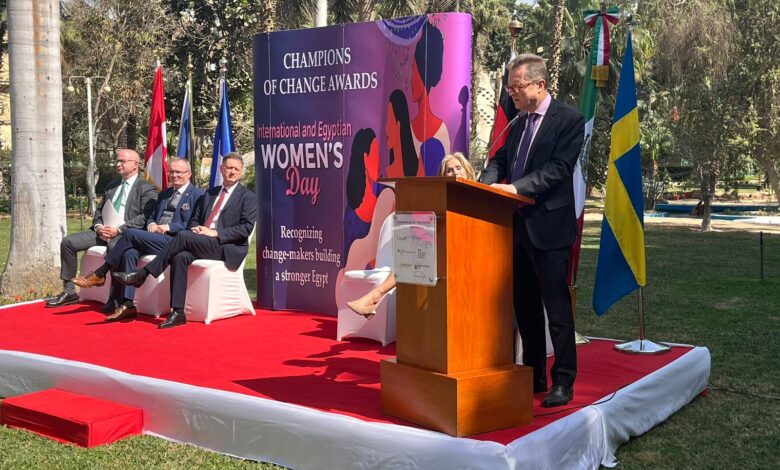
Ashraf AboArafe
Today, Ambassadors Louis Dumas, Ambassador of Canada, Ambassador Ivan Jukka, Ambassador of the Czech Republic, Ambassador Eric Chevalier of France, Ambassador Frank Hartmann, Ambassador of Germany, Ambassador Leonora Rueda of Mexico, and Ambassador Håkan Amsgaard, Ambassador of Sweden, organized a joint ceremony to honor 12 A distinguished Egyptian woman was awarded the “Heroines of Change” award.
The German Embassy in Cairo and its partners recognized the contributions of pioneers in the field of gender equality and celebrated the social, economic and political achievements that brought about changes for prominent Egyptian women ahead of International Women’s Day.
Ambassador Frank Hartmann personally handed over the awards to Ms. Namis Arnous – founder of the Ehki Network – and Ms. Salwa Al-Laqani – founder of the Very Nile store – who were nominated by the German Embassy.
The ambassador stressed, “The more different and diverse we are, the more we can achieve together.” Therefore, Germany follows a feminist foreign policy. Today’s “Heroes of Change” have highlighted, through their contributions in many fields, the importance of empowering girls and women to shape their societies and participate fully, whether through social media or community activism. They are an inspiration to us all.”
Ambassador Hartmann also honored the young participants in the final of the poetry competition held online, “Dream, Think, Hebrew,” which was organized by the German Embassy, and they were Darim Hani, Jana Sharif, and Hajar Ali. The ambassador explained that their poetic artistic works are innovative, inspiring, and reflect the fears and dreams of their generation.
Germany follows a feminist foreign policy and women’s affairs are the focus of its attention. Women’s voice, ideas, and ability are a major source of development and stability in society. In order for us today to be able to face difficult challenges, all different parties in society must participate.
Therefore, the German Embassy in Cairo supports various projects to empower women, ranging from vocational training to educational campaigns on women’s freedom and rights. We trust that our Egyptian partners are best placed to determine how and where these activities can have a sustainable impact and set an example.
All our projects are gender sensitive as we observe how they affect women and men differently and accordingly support both genders. We can thus create an environment in which equality prevails between men and women and continues even after the end of the project period.




